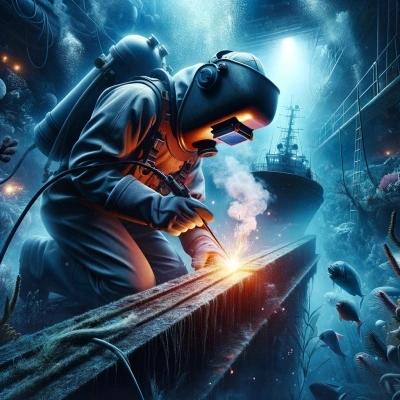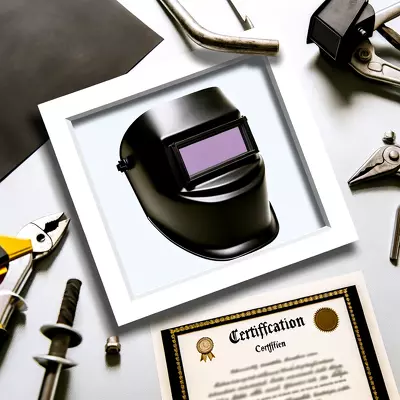Welding Beneath Waves: Deciphering Why Underwater Welding Is Fraught with Danger

Underwater welding, a specialized form of technical diving, presents unique risks and challenges. This process, essential for repairing and maintaining structures submerged in water, combines two inherently hazardous tasks: welding and diving. The difficult environment, compounded by the complex interaction between water and electrical equipment, creates a set of dangers that are distinct from traditional welding or diving. This article explores the factors contributing to the high risk associated with underwater welding.
I. Introduction to Underwater Welding
A. Definition and Overview
Underwater welding encompasses a range of techniques primarily used for repairing and maintaining structures beneath the water’s surface. This specialized field blends the skills of welding and diving, requiring professionals to be adept in both. ItIt’s allows for the construction and repair of ships, offshore oil platforms, pipelines, and other vital marine infrastructure.
B. Importance in the Marine Industry
The marine industry relies heavily on underwater welding for the upkeep and emergency repair of its structures. This welding method is crucial for maintaining the integrity of
vessels and platforms that are exposed to harsh marine environments. Without underwater welding, the longevity and safety of these structures would be significantly compromised, affecting industries like shipping, oil and gas exploration, and even underwater research.
II. Unique Challenges of Underwater Welding
A. Environmental Conditions
Underwater welders face unpredictable environmental conditions, including strong currents, limited visibility, and varying water temperatures. These factors not only make the job physically demanding but also increase the complexity of welding tasks. The presence of water around the welding site adds layer of difficulty, affecting both the welding process and the equipment used.
B. Technical Complexities
The technical aspect of underwater welding is significantly different from traditional welding. Welders must use specialized equipment designed to function in wet conditions and often work in confined spaces. The techniques employed, such as hyperbaric welding, require precise control and a deep understanding of the physics involved in underwater operations.
C. Safety Protocols and Equipment
Safety is a paramount concern in underwater welding. The use of specialized equipment like dry suits, diving helmets, and underwater welding tools is critical. Welders must adhere to strict safety protocols, including communication systems, emergency procedures, and constant monitoring for hazards like differential pressure or “delta-p” situations.
III. Risks Associated with Underwater Welding
A. Electrical Hazards
One of the primary risks in underwater welding is the threat of electric shock. Ensuring the safety of electrical equipment in a conductive environment like water demands rigorous standards and precautions. The use of insulated tools and adherence to specific electrical protocols is essential to mitigate this risk.
B. Diving-Related Dangers
In addition to welding risks, divers are exposed to a variety of diving-related dangers, such as decompression sickness, nitrogen narcosis, and oxygen toxicity. These risks are compounded by the fact that underwater welders often work at significant depths for extended periods.
C. Physical and Psychological Stress
The physical demands of underwater welding, including handling heavy equipment in challenging environments, can lead to fatigue and injury. Moreover, the psychological stress associated with working in confined, often isolated underwater environments can impact a welder’s performance and overall mental health.
IV. Case Studies and Incidents
A. Historical Accidents
Several historical incidents highlight the dangers of underwater welding. These range from equipment failures that have led to fatalities to instances of decompression sickness due to improper ascent protocols. Analyzing these accidents provides valuable insights into the profession’s inherent risks.
B. Analysis of Safety Failures
In many cases, a thorough investigation of underwater welding accidents reveals lapses in safety measures or procedural errors. This analysis helps in identifying potential areas for improvement in safety protocols and equipment.
C. Lessons Learned
Lessons learned from past incidents have been instrumental in shaping current safety practices and regulations in underwater welding. They serve as a reminder of the need for continuous vigilance and adherence to safety standards in this high-risk profession.
V. Comparison with Traditional Welding
A. Differences in Techniques
Comparing underwater welding to its traditional counterpart highlights significant differences in techniques and challenges. While traditional welding occurs in a controlled environment, underwater welding must contend with the dynamic and often unpredictable aquatic environment.
B. Safety Measures in Traditional Welding
The safety measures in traditional welding, though comprehensive, differ in focus and application from those in underwater welding. Traditional welding prioritizes protection against heat, fumes, and arc radiation, while underwater welding emphasizes the mitigation of electrical, diving-related, and environmental hazards.
C. Risk Assessment
Risk assessment in underwater welding is a complex process that incorporates a range of factors,, from environmental conditions to the welder’s physical and psychological fitness. This comprehensive approach to risk assessment is essential to ensuring the safety and success of underwater welding operations.
VI. Advancements in Underwater Welding Safety
A. Technological Innovations
Significant technological advancements have been made in recent years to enhance the safety of underwater welders. Innovations in welding equipment, diving gear, and communication systems have contributed to reducing the risks associated with the profession.
B. Improved Training and Certification
The importance of rigorous training and certification in underwater welding cannot be overstated. Enhanced training programs that focus on both welding and diving skills,
Along with stringent certification requirements, these have improved the overall safety and competency of underwater welders.
C. Future Prospects
The future of underwater welding looks promising with ongoing research and development in safety protocols and technology. There is a growing emphasis on automated and remote welding solutions to minimize human risk, signaling a potential shift in how underwater welding operations are conducted in the future.
The exploration of why underwater welding is so dangerous reveals a profession that balances immense risk with critical importance. Through continuous advancements in safety, technology, and training, the underwater welding industry strives to safeguard its workers while maintaining the essential structures that underpin key sectors of the global economy.
VII. FAQs
Q: What exactly is underwater welding?
A: Underwater welding combines welding and diving techniques, allowing welders to perform repair and construction tasks on submerged structures like ships, pipelines, and offshore platforms.
Q: How dangerous is underwater welding compared to regular welding?
A: Underwater welding is significantly more dangerous due to the combination of electrical hazards, the potential for decompression sickness, and the unpredictable underwater environment.
Q: What qualifications are needed to become an underwater welder?
A: To become an underwater welder, one must be a certified welder and commercial diver, capable of performing tasks associated with commercial subsea work and welding in accordance with specific underwater welding codes.
Q: What is the average annual salary for an underwater welder?
A: Salaries for underwater welders vary widely, typically ranging from $100,000 to $200,000 per year, depending on factors like project availability, depth, dive method, and diving environment.
Q: How much can a welder earn working on an oil rig?
A: While specific salaries can vary, underwater welders working on oil rigs are often at the higher end of the pay scale due to the demanding nature of the work and the critical importance of oil rig maintenance.
Q: What are the common risks associated with underwater welding?
A: The main risks include electrical hazards, drowning, decompression sickness, hypothermia, and potential wildlife encounters. Psychological stress and physical strain are also significant factors.
Q: Are there any career advancement opportunities in underwater welding?
A: Experienced underwater welders have various career advancement opportunities. Many go on to become engineers, instructors, diving operation supervisors, and consultants for underwater welding operations.
VIII. Conclusion
A. Summary of Key Points
The article provided an in-depth look at the dangers and complexities of underwater welding, exploring its risks, technical challenges, and the necessary safety measures. The comparison with traditional welding and the discussion of advancements in the field provided a comprehensive understanding of this unique and hazardous profession.
B. The Future of Underwater Welding Safety
The future of underwater welding safety looks promising with ongoing advancements in technology, training, and safety protocols. The industry continues to evolve, aiming to reduce risks and improve outcomes for those in the field.
C. Final Thoughts
Underwater welding remains a crucial yet dangerous profession. The combination of diving and welding under challenging conditions demands the highest standards of safety and expertise. As technology and training continue to advance, the goal remains to minimize the inherent risks of this demanding but essential trade.
IX. Suggested Readings
The article concludes with a list of recommended readings for those interested in learning more about underwater welding. These resources provide valuable insights into the techniques, history, and safety aspects of underwater welding.
- “Underwater Welding Guide” by Water Welders: A comprehensive resource for training and career preparation in underwater welding.
- “Underwater Wet Welding: A Welder’s Mate” by David Keats: A detailed look at the history, terminology, and techniques of underwater welding.
- “Into the Lion’s Mouth: The Story of the Wildrake Diving Accident”: An exploration of a true story that uncovers the layers of a routine diving operation turned tragic.
- “The History of Oilfield Diving”: A book that delves into the transition of offshore commercial diving from recreational to professional.
- “Trapped Under the Sea: One Engineering Marvel, Five Men, and a Disaster Ten Miles Into the Darkness”: A gripping account of a commercial diving mission with unforeseen consequences.
These books are available on platforms like Amazon and provide both technical knowledge and real-world perspectives on underwater welding. They are an excellent starting point for anyone considering a career in this field or those already in it looking to expand their knowledge.





